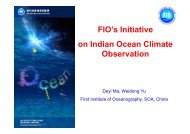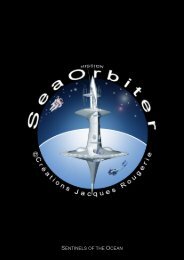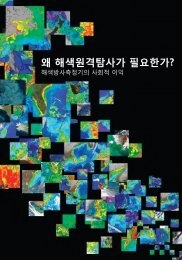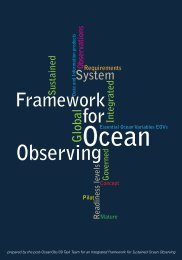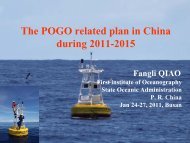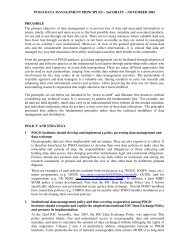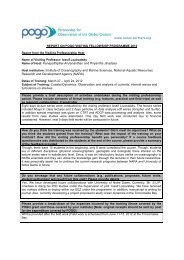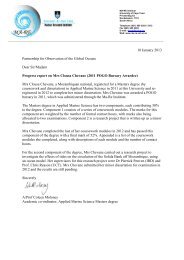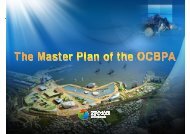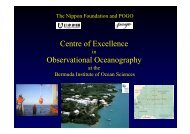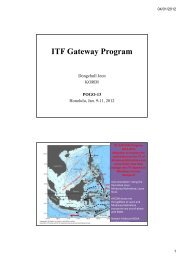NF-POGO Centre of Excellence Year 2 Report
NF-POGO Centre of Excellence Year 2 Report
NF-POGO Centre of Excellence Year 2 Report
- No tags were found...
You also want an ePaper? Increase the reach of your titles
YUMPU automatically turns print PDFs into web optimized ePapers that Google loves.
incorporate more laboratory and/or field skills into each module. The year 1 Scholarsthought this an excellent approach.Scholars were very happy with the addition <strong>of</strong> new modules and the increasedefforts to get them into the laboratory for more hands-on training.4. Related to #3, the research projects will be <strong>of</strong> shorter duration in year 2 and will be muchmore directed by BIOS faculty. Our problem in year 1 was that many students tookseveral weeks to decide on a project. While we encouraged Scholars to talk with facultyabout their projects, many Scholars rotated through faculty several times as theyattempted to finalize a project. This was frustrating for faculty and was not a productiveuse <strong>of</strong> Scholar time/energy. For year 2, the projects will be much more directed, but thatdoes not mean we will „force‟ students to do a project if they have the backgroundnecessary to convince us they want, and can, do something else. Our goal is to minimize„slippage‟ (i.e., to get Scholars started on a reasonable project in a short period <strong>of</strong> time,rather than having them spend weeks mulling idea after idea).This was the most positive <strong>of</strong> all changes. Scholars had a much better idea <strong>of</strong> thework they were going to be involved with from an earlier stage.5. During the exit interview (Section 2.12), several Scholars told us that they had learnedthey needed a very detailed description <strong>of</strong> what they had done as part <strong>of</strong> the C<strong>of</strong>E. SomeScholars needed this for their home institution (i.e., many Scholars needed to „prove‟ thatthey had been trained as part <strong>of</strong> the C<strong>of</strong>E). Other Scholars needed a detailed document <strong>of</strong>their work in order to obtain academic credit (e.g., a couple <strong>of</strong> Scholars had applied tograduate programs and wanted to receive academic credit for their work at BIOS as part<strong>of</strong> their degree). Our plan for year 2 is to have instructors assign „grades‟ at the end <strong>of</strong>each module (we are still debating whether these will be letter grades, e.g., A, B, C, etc,or a more descriptive evaluation such as First, Second, With Distinction, etc.). We willalso give a „grade‟ for the final independent project (including the work itself, the finaloral presentation about the work, and the written report <strong>of</strong> the work).The grading system worked well. It allowed students to determine how they wereprogressing during the course <strong>of</strong> the Programme. Several students have subsequentlyasked for copies <strong>of</strong> their transcripts, which they will use as part <strong>of</strong> their applicationpackage to graduate schools.6. We made several changes to the modules:Our original plan for year 1 was to have a „core skills‟ module when the Scholars firstarrived. Our goal was to teach basic skills in writing (especially scientific writing) andoral presentations. As many <strong>of</strong> the Scholars arrived late, we decided to incorporate thepresentation skills into weekly seminars (Section 2.8 and 2.9). This worked well. Incontrast, we did not do a sufficient job <strong>of</strong> helping students improve their writing skillsuntil the final reports were due (Section 2.10). We will include a „core skills‟ modulein year 2 AND we will require that each module have at least one writing assignmentthat will be evaluated as part <strong>of</strong> the student grade.This worked well, but still needs improvement. We need to be more proactivein grading written reports and getting them back to Scholars in a timely fashion.Our plan for year 1 included a module on data management. This proved intractable,as the instructors, part <strong>of</strong> the Ocean Data team from Belgium, were not able toparticipate as originally scheduled. The team is scheduled for year 2.This was a very successful module and is scheduled as part <strong>of</strong> the year 3programme.15




